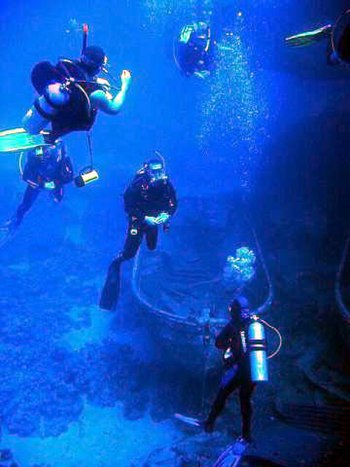_________________________________________________________________________
Fiona - Stacy, last time I saw you, you were generously offering me your bathing suit, and that's how I
learned that you are quite the under water adventurer. First, thank you for your kind generosity.
Can you introduce yourself to the readers?
 |
| Author, Stacy Allen |
Stacy - Hi everyone, I'm Stacy Allen, author of the
upcoming debut, Expedition Indigo,
(August 18, 2014), the first in
my Riley Cooper Romantic Suspense
series. Expedition Indigo introduces Dr.
Riley Cooper, an archaeology
professor who is thrust into the world of
wreck diving and treasure hunting when she
travels to Italy with a team
of treasure hunters to find and salvage The
Indigo, a cargo ship that sank off the coast
of Sorrento in 808 A.D. Dr. Cooper is
persuaded by her mentor to take his
place on an expedition to Italy, where she
will assist a team of treasure hunters to
salvage an ancient shipwreck
off the coast of Sorrento, Italy.
Fiona - What was your motivations
writing this series?
Stacy - I wanted to write a novel that showed that we are all
Stacy - I wanted to write a novel that showed that we are all
stronger than we think we are. All of us have
self-doubts and misgivings of what we are capable of, and yet, when things get tough, the human
condition shows us strength and courage we didn’t know existed, and gets us all through the tough,
trying times that life throws at us. When you first meet Riley, she is unsure of herself and doubtful she
has what it takes to go on this mission. By the end of the book, she has found out what the reader
knew all along: that she is more than capable of the tasks she is given. She has a new respect for
herself, when she realizes that without her courage and strength, lives would have been lost and
treasures would have been stolen. I want the readers of this book to realize, through Riley’s story,
that they are also capable of doing the difficult, seemingly impossible things that we are faced with in
our lives. Even when we don’t think we can, we have what it takes.
credentials and background with us?
 |
| Ron and Stacy kayaking on Lake Panama |
Stacy - I have an Advanced Open Water Diver
certificate, with specialties in wreck diving
and night diving.
I have traveled to Italy many times. My
passion for adventure has taken me to six
continents, in order to explore over 53
countries. I have studied many languages,
but am most comfortable with
Italian and French, having studied both for
many years. My love of history, treasure
hunting, Italy, archaeology and wreck
diving led me to my character, Dr. Riley
Cooper, and sparked the fire to write
Expedition Indigo, the first in the Riley
Cooper series.
Fiona - Just to fill everyone in, Stacy chose Italy
as the first location (it is her second home
and she speaks Italian). The second book is
set in Cyprus, 3rd in Egypt and the 4th in
Iceland.
 |
| Ron and Stacy, Giza, Egypt |
Stacy - Yes, so other than that, I'm married, living
just north of Atlanta, Georgia. I play
guitar, sing, and do a zillion things. Like
most writers, I have a ton of interests. I
was that little girl (now woman) who
wanted to conquer the world and see
every inch of it.
Fiona - And your experience diving? Tell me
about taking the plunge.
Stacy - My very first SCUBA experience was in
St. Thomas (U.S.V.I.) I was on vacation
and I took an Intro to SCUBA course.
After a bit of pool work, off we went. My
very first dive was:
a) in the ocean
b) a wreck dive and
c) in very deep water.
I was immediately hooked. Ignorance is bliss, however. Years pass and I move to Atlanta, and I
decide I should just go ahead and get my SCUBA certificate. I go sign up and start the classroom
lessons and reading books and my reaction was "I am lucky to be alive!" I didn't know anything
about current or nitrogen narcosis or any of the other dozens of things that could have killed me on
the check-out dives I had done. I got my certification here in Atlanta after doing my required "open
waters" in Cozumel, Mexico.
Open water dives are required because you can only learn so much in a class room.
When you do your open water dives as your final step, you and an instructor go out - either in
the open ocean or in a river or lake - some body of water other than a swimming pool.
There I was tested on my skills (mask clearing, equipment removal, that is taking off my gear and
putting it back on underwater, underwater signals, buddy breathing, things like that. I then got my
advanced certification pretty soon after that. For my advanced, I went to Crystal Springs, Florida.
For my Open Waters I did a navigational dive (where you rely solely on your compass and not
your eyes), a flora and fauna dive, and a cave dive.
After I got my Advanced Certification, I then spent time in Key West, where I got my
After I got my Advanced Certification, I then spent time in Key West, where I got my
Nitrox certification.
Fiona - Did you always love being in the water?
and played as much as we could. One afternoon,
I dived in where I shouldn't have. There was a rock
ledge and I hit it, scraping all down my side, and dazing
me but not knocking me out. I remember every second
of that experience. I floated gently to the bottom, and I
remember seeing the sun's rays coming through the
water, and I blacked out. My brother Kevin dived in
and found me, brought me up, and saved my life. You
know they say your life passes before you, and it surely
did that day. I think I was around six or seven years old.
I wouldn't go near water for years. I was completely
panicked and terrified. So my mother told me I had to
get over the fear, and she sent me to the Y to learn to
swim when I was in Jr High. I couldn't do it. So I had to
go back a second time. It was also a
go back a second time. It was also a
disaster.
When I was about 21, I decided I had better learn to
swim. I went to the Virgin Islands on a
swim. I went to the Virgin Islands on a
vacation. I decided the best way to get over my fear of water was to jump off a boat in the ocean.
That's what I did! I hyperventilated and was terrified, but I stayed in the water. And some baby
steps later, on another vacation to St. Thomas, I took that fateful SCUBA intro class. So my biggest
obstacle was my own fear. And that is now, thankfully, gone.
Fiona - Which is a great set up for any heroine - to face a fear of water to save the situation.
Stacy - Absoluetly!
Fiona - What are some of the things that a writer without your
Fiona - Which is a great set up for any heroine - to face a fear of water to save the situation.
Stacy - Absoluetly!
 |
| Ostia Antica, Italy |
Fiona - What are some of the things that a writer without your
background might write by mistake that would have a
SCUBA diver shaking their head and saying - I can't
read this anymore, she got this all wrong!
Stacy - Ha! Let's see.
* Calling air tanks "oxygen" drives us up
Stacy - Ha! Let's see.
* Calling air tanks "oxygen" drives us up
the wall. It is a mixed gas air tank, and is basically
surface air that has been compressed into a tank.
Like using those Vacuum bags on big blankets. The
blankets are in tact, they are just compressed and
take up less space!
* Thinking that as long as you have air in your
tank you can stay underwater.
* Thinking that if a diver is low on air, they can just
hold their breath as long as they can and only breathe when necessary to make the tank last
longer. The first, and I do mean the first, rule of diving is BREATHE. We must inhale, followed by
an exhale, continuously the entire dive. It can be deadly to hold your breath underwater. We must
"off -gas" which means expel our breath so nitrogen does not build up in our bloodstream. If gases
are stuck in our bloodstream, as we ascend to the surface, they will expand and cause The Bends
"off -gas" which means expel our breath so nitrogen does not build up in our bloodstream. If gases
are stuck in our bloodstream, as we ascend to the surface, they will expand and cause The Bends
which very often will kill a diver. That is why divers do Safety Stops at 25 or 20 feet (I do them
around 25 feet), which is to hang there and off-gas for 3-5 minutes (3 is what we learned,
experienced divers do a 5 minute stop).
Fiona - Okay here is my last and most important question. What is your favorite scar and how did you get it?
Fiona - Okay here is my last and most important question. What is your favorite scar and how did you get it?
Stacy - Hah! Wow. In August of 2000, I was living in Seattle. I was opening up a bottle of vitamins, or
trying to, and the stupid plastic seal around the top wasn't budging. I was frustrated, so I grabbed a
french boning knife out of my kitchen (can you say S.T.U.P.I.D.?) and in a split second I had sliced
my left index finger nearly off. I held my hand up and my forearm was coated with blood in a tenth
of a second. I could see the bone in my finger! (insert "GROSS!" here). I went into shock
immediately. I ended up having reconstruction on that finger, and it has taken years to recover, and I
still can't bend it entirely. But I could play guitar again after a couple of years, and that is something I
didn't think I would ever be able to do again.
Fiona - That was a most excellent scar story! And having listened to you play and sing on several
occasions, I can say it would be a big loss had you not regained your ability.Thank you so much
for sharing. It's been a pleasure having you on ThrillWriting today.
 |
| Stacy in Portugal |
Stacy Allen served on the Board of Trustees of the Pacific Northwest Writers Association, the Pacific Northwest Mystery Writers of America chapter, and currently serves as Vice President of the Southeast Mystery Writers of America (SEMWA) chapter. She is represented by Jill Marr, of Sandra Dijkstra Literary Agency.
Expedition Indigo will debut August 18, 2014, and will be available in all electronic formats and audio, from Entranced Publishing. It will also be available in print.
You can get in touch with Stacy:
FB: https://www.facebook.com/stacy.allen.754
Pinterest: http://www.pinterest.com/stacyallen5/












